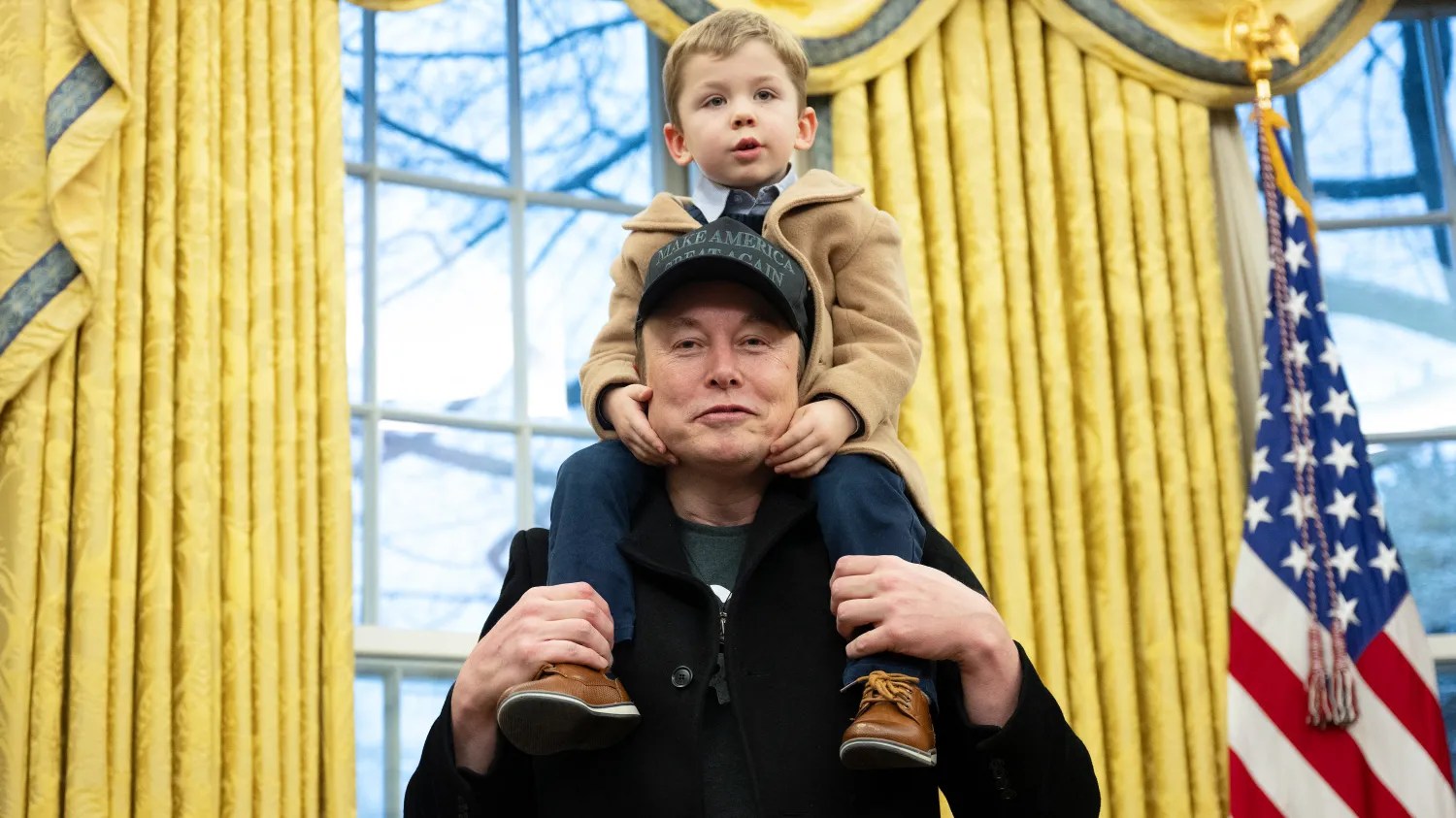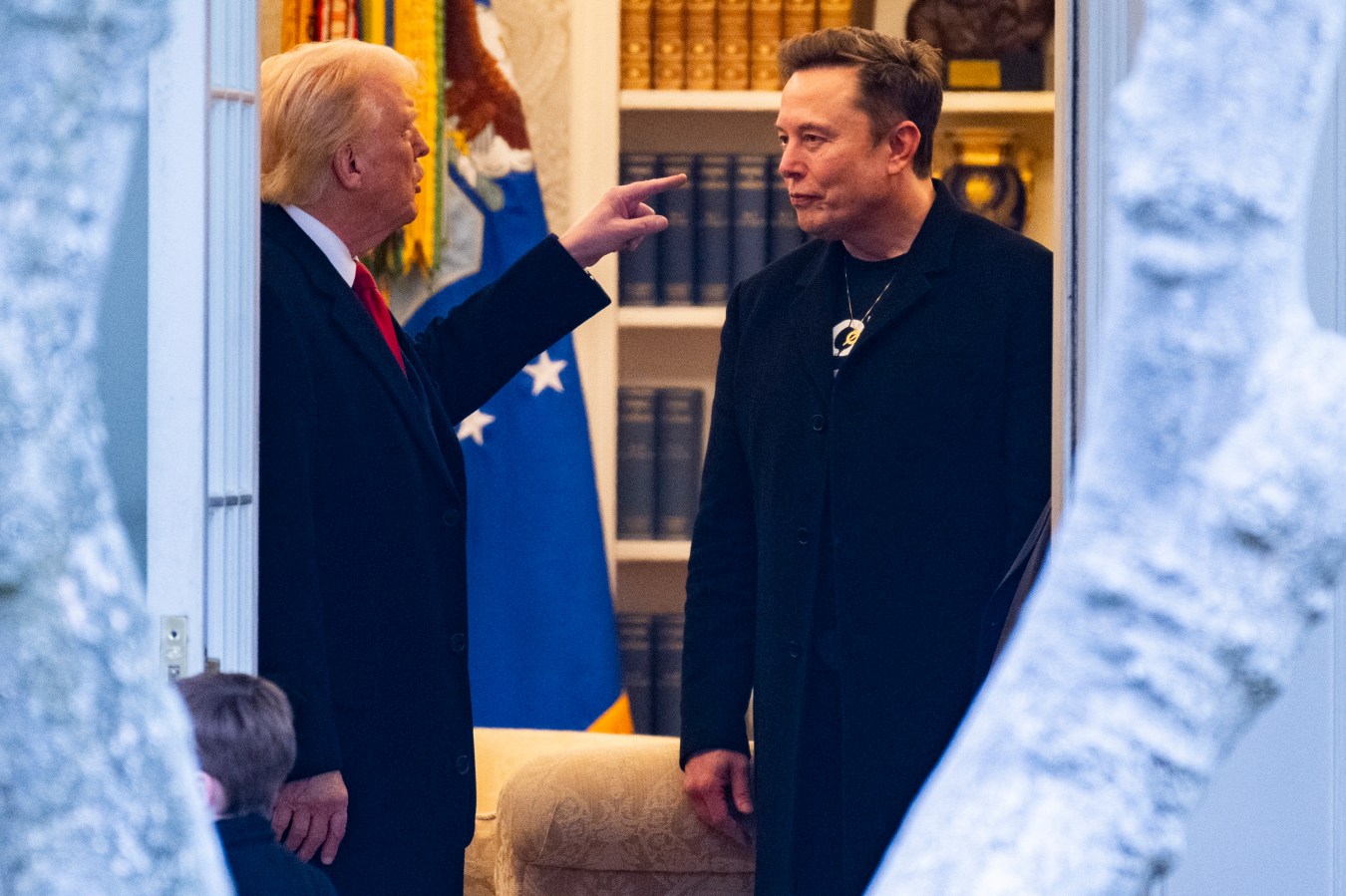In just two weeks, Elon Musk has become one of the most powerful people in the federal government. After setting up shop in the U.S. Office of Personnel Management, Musk blast-emailed over 2 million federal employees with the offer to retire early. He has successfully convinced President Trump to attempt to curb or even shut down the $40 billion U.S. Agency for International Development. And his team of DOGE lieutenants has gained access to the U.S. Treasury Department’s payment service.

Tesla CEO Elon Musk (R) joins former US President and Republican presidential candidate Donald Trump during a campaign rally at site of his first assassination attempt in Butler, Pennsylvania on October 5, 2024. (Photo by Jim WATSON / AFP) (Photo by JIM WATSON/AFP via Getty Images)
AFP via Getty Images
Until yesterday, it was not clear what legal authority Musk had to be carrying out any of these projects. Was he just freelancing under Trump’s direction, or was he an official government employee? The White House answered the question on Monday when White House press secretary Karoline Leavitt announced that Musk is a Special Government Employee, or SGE.
For Musk, the world’s richest man, the benefit of being a SGE rather than a full-time government employee is obvious: He does not have to publicly disclose his financial interests or potential conflicts of interest. Unlike cabinet members, who disclose their investments and business relationships in forms published for all to see, special government employees complete confidential financial disclosures, which are also known as OGE Form 450s. These forms are only shared with the White House and Office of Government of Ethics.
In the case of Musk, who appears to be wielding unprecedented power over the federal bureaucracy, this distinction poses ethical and possible legal issues, according to former White House ethics lawyers who spoke with Forbes.
“Obviously, this is a workaround in that if someone’s exercising that much power, you would think they would be a full time government employee and file a financial disclosure form,” says Richard Painter, former chief White House ethics lawyer in the George W. Bush administration, who argues that Musk is not a normal special government employee. SGEs, of which there are typically a few thousand at any given time, tend to be advisory positions with discreet areas of focus, rather than positions with broad remits and power over civil servants.
“The point is that someone with this much power isn’t supposed to be an SGE,” adds Painter. “This SGE thing isn’t just a technicality. They don’t want the public to know what [Musk] owns or what his financial holdings are. They’re avoiding the disclosure law.”
“No matter the requirements, Musk should go above and beyond them so there are no questions about blending his personal and private interests with his work to save taxpayer dollars,” adds Scott Poge, general counsel of the Project On Government Oversight. “Transparency is essential for his ethics forms, but also his meetings, activities, and work product to ensure that he is truly working in the public’s interest.”
Of course, much of Musk’s $420 billion net worth (as of February 4) is already publicly known: His $210 billion stake in Tesla is publicly traded, while his $191 billion holdings in private firms SpaceX, X (formerly Twitter), xAI, Neuralink and the Boring Company are also publicly known. These businesses are regulated by, and in some cases doing business with, the federal government. SpaceX relies on billions of dollars in federal contracts and has done business with the U.S. AID, the federal agency Musk now wants to shut down, while Tesla is heavily reliant on China, which is the carmaker’s largest market and producer of Tesla vehicles.
But Musk also has an estimated $9.5 billion in cash and liquid investments, from previous sales of his Tesla shares, which remain shielded from the public’s eyes. The tycoon also owes up to $3.5 billion to banks that extended him personal loans secured by 238.4 million shares of Tesla (worth about $92 billion), according to Tesla’s pledging policy disclosed in financial filings.
“With his immense wealth, there is no way to imagine all of the potential conflicts,” says Don Fox, former acting director of the U.S. Office of Government Ethics under President Obama, who adds that Musk is legally required to file a private OGE Form 450 even if he’s not being paid. “All SGEs must file a financial disclosure because otherwise there is no way to screen them for conflicts of interest.”
The purpose of SGEs completing a Form 450 is so that the White House can determine whether an individual’s financial holdings pose conflicts or interest with their governmental roles. All SGEs, like all full-time employees, must comply with the criminal conflict of interest statute, which prohibits them from “participating personally and substantially in official matters where they have a financial interest,” according to the Office of Government Ethics. The statute of limitations for this statute is up to five years, according to Painter.
It is not clear Musk has completed that form. Forbes asked this question in an email to The White House press office and immediately received a canned response shared with other media outlets that Musk “is selflessly serving President Trump’s Administration as a special government employee.” A spokesperson for the The Office of Government Ethics, which is charged with enforcing financial disclosures for government employees, declined to comment, citing their policy of not discussing specific individuals.
Fox says he doubts that Musk has, or ever will, file his financial disclosure form. “I don’t believe his employer cares one way or the other.”
Look back on the week that was with hand-picked articles from Australia and around the world. Sign up to the Forbes Australia newsletter here or become a member here.


